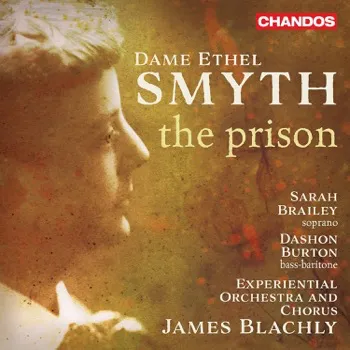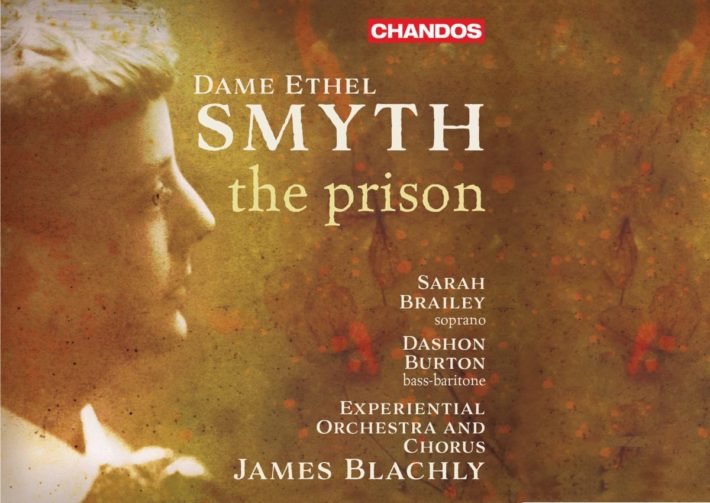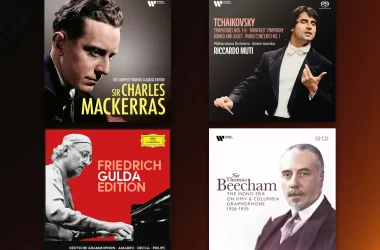Dame Ethel Smyth was born into a musically and socially dynamic era, one in which she met Clara Schumann, Dvorak, Brahms, Grieg, and Tchaikovsky. While the critics at the time criticized her music for being “too masculine,” it may very well have been a powerful if not defiant statement regarding the challenges women at the time faced. Chandos, which has previously released a disc of her Mass in D among other works (reviewed here), presents the very first recording of The Prison to date.

The Prison (1929-30) is one of Smyth’s finest late works and shows a well-versed composer not afraid to take creative risks. A large-scale vocal symphony that is a conversation between a wrongfully-convicted prisoner and his soul, it exudes a complexity that calls into mind Brahms (whom she admired greatly) and Mahler. It also carries a weighty philosophical presence: the text is by her close friend Henry Bennet Brewster.
That we should regret that Smyth has not gotten more credit as a composer becomes evident upon hearing this work, which is brought to life impressively by Dashon Burton as the prisoner, Sarah Brailey as his soul, and the Experiential Orchestra and Chorus. In the opening movement, Smyth already makes use of different instruments (violin, harp, and later woodwind) for vivid motivic and programmatic effect. Burton not only has clear diction that makes us understand the plot, but his emotive approach also quickly draws us into the experiences of the brooding and forlorn prisoner.
Haunting at times and hopeful in others, Brailey as the Soul is delicate and veiled in ephemerality, a musical antithesis to the prisoner. In the moments where the Prisoner and Soul sing together, I would have liked to hear more of Brailey’s voice. But in some ways, it is this “imbalance” which is appropriate to the story’s concept: the Soul is a ghostly presence that we strive to hear, but perhaps only speaks to its owner.
We can appreciate Smyth’s masterful use of multifaceted compositional styles in “Voices of Immortality” (track 2): the orchestration, especially the heavy brass at certain moments, gives the ensemble a Wagnerian presence, one whose earthly existence contrasts with the Voices, perhaps akin to a Greek tragedy’s Chorus. The vocal writing, which uses elements such as parallel harmonies and fleeting moments modality, is a balanced combination of hymn and chant.
Although the work is of many movements, the performers do well in maintaining the story’s trajectory by showing the dynamic development of the characters. “The Prisoner Understands His Own Immortality” (track 8) is one excellent example: both Burton and the orchestra (which provides an imaginative interlude in the previous track) epitomize this understanding as an awakening. in ”His Soul Tells Him the End of the Struggle is at Hand” (track 10) he Prisoner embodies hope within a largely tonal framework, while the Soul does so in sadness, even foreboding.
The vocal and ensemble writing here, too, is intriguing: whereas the Prisoner has a clear melodic line that the orchestra supports with accompanimental figures, the Soul sings on just one haunting note (controlled very well throughout by Brailey). The orchestra, once again, does a fine job in playing a central role, one that brings different colors to the note through an ever-changing backdrop of harmony.
“He Disbands his Ego” (track 13) is what we might consider the Prisoner’s final step in his realization of letting go of his physical being. Smyth’s descriptive writing, as well as Brailey’s powerful performance, portrays this beautifully, from the Prisoner’s tone of determination that dissipates into a solitary conversation with solo violin.
The liner notes give crucial insight into Smyth’s convictions which underlie this work; the Conductor’s Note at the end is also a valuable addition. This performance is a riveting experience and a must-listen.
Dame Ethel Smyth – “The Prison”
Dashon Burton – Bass-Baritone (The Prisoner)
Sarah Brailey – Soprano (His Soul)
Experiential Chorus (Voices)
Experiential Orchestra
James Blachly – Conductor
Chandos Records, Hybrid SACD CHSA5279




















